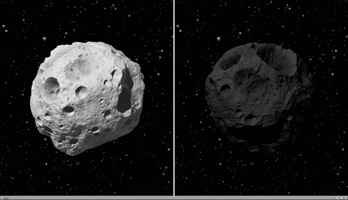
Click on the image for the animationThis animation illustrates the benefits of observing asteroids in infrared light. It begins by showing two artistic interpretations of asteroids up close. They are about the same size but the one on the right is darker. The animation zooms away to show how a visible-light telescope would see these two space rocks, located at the same distance millions of miles away from Earth, against a background of more distant stars. The one on the left would be much easier to see because it reflects more visible light from the sun.
The animation then transitions to an infrared view of the same two objects. Both asteroids are equally as bright because the telescope is picking up infrared light coming from the bodies themselves, as a result of being heated by the sun. The measurements are not strongly affected by how light or dark an asteroid is, a property called albedo. Instead, the brightness is more directly related to an asteroid's size. Therefore, infrared telescopes like WISE are better at both finding the small, dark asteroids and determining asteroid sizes.
JPL manages the Wide-field Infrared Survey Explorer for NASA's Science Mission Directorate, Washington. The principal investigator, Edward Wright, is at UCLA. The mission was competitively selected under NASA's Explorers Program managed by the Goddard Space Flight Center, Greenbelt, Md. The science instrument was built by the Space Dynamics Laboratory, Logan, Utah, and the spacecraft was built by Ball Aerospace & Technologies Corp., Boulder, Colo. Science operations and data processing take place at the Infrared Processing and Analysis Center at the California Institute of Technology in Pasadena. Caltech manages JPL for NASA.
More information is online at http://www.nasa.gov/wise and http://wise.astro.ucla.edu.

